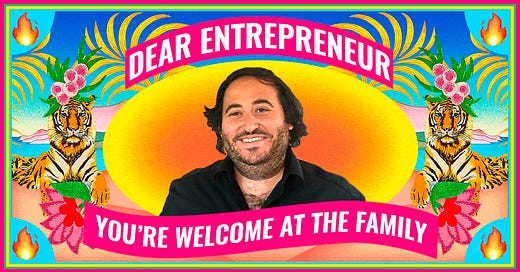There’s no single answer to that question. But I can say that you should be in a situation where you’re guided by your own intensity.
One problem lots of people have is that they don’t use their time intensely enough. The worst thing you can do as an entrepreneur is to waste your time, not putting a maximum of energy into what you’re doing. If you do that, you end up with a lot of regrets, because you’ll never really know if things didn’t work because it was impossible, or simply because you didn’t put the needed effort into it.
Once you’re dedicated to real intensity, keep 3 things in mind:
Stop listening to others. Nobody out there can tell you what to do, so avoid the advisors, avoid the mentors, avoid me, everybody. The only thing you should be doing is trying, trying, trying more.
Put yourself in danger. If you don’t, you won’t really know. If you try to keep your day job and build a startup on the side, you’re not going to find out the truth about an idea’s potential. Don’t try to raise money before you go full-time on a project, it doesn’t work. Be intense, and the decision will become your own, it’ll become obvious.
Don’t become the prisoner of your own story. Never lie about how successful your startup is with the people you love. Why? Because a horrible thing happens to an entrepreneur when you lie to the people who are closest to you, your partner, your parents, your best friend, whoever: you feel the need to live up to the lie.
That last one is super, super important. Way too many entrepreneurs trap themselves in an impossible world where they aren’t able to tell anyone the truth of what they’re going through. If you start lying to the people you love, you end up in situations that leads to super bad results — mental breakdowns, divorce, estrangement, you name it; when they find out it’s all been a lie, it’s going to be so, so horrible.
Plus, getting back to the question of knowing when an idea has failed, if you don’t follow that rule you’ll be in a situation where you can’t stop — because stopping doesn’t just mean that the business didn’t work, it means that you’re a liar who built up this entire fake world.So the best thing to do, the best way to protect yourself and to let yourself see clearly, is to avoid putting yourself in that prison of false expectations.
Find people you can really trust, people you can talk to about just how bad things are, how nothing’s working. And make sure that those people know it’s not their job to tell you to stop; you’ll be the one to decide that, you’re the only one who can really know.
Entrepreneurship is a test, in so many ways, with so many steps. It tests how well you know yourself; it tests how willing you are to learn; it tests how you’re able to make people believe, how you’re able to manage them; if things go well, it tests your ability to handle success, to stay a normal person, to not believe the stories being told in the media about how great you are.
All those tests can be failed in different ways. And you actually have to accept that you will fail some of them, that it’s normal not to be perfect at every step.
That’s why it’s so important to set up the world around you in a way that lets you clearly see the situation, one where you can be the one who decides whether you keep going or whether you stop. Building that confidence in your own ability to decide is so much better than tracking a KPI or listening to a mentor or anything like that.
And don’t forget, it’s always good to have another startup idea that you’d really like to do, too. If you always have a Plan B in mind, something else really cool that you’d love to build, it’s much easier to say, “Time to kill Plan A.” That’s a mental place where you can take the big risks that are necessary, the risks that really put your business in danger, but that also put it in a position to create something super ambitious, something absolutely incredible.














